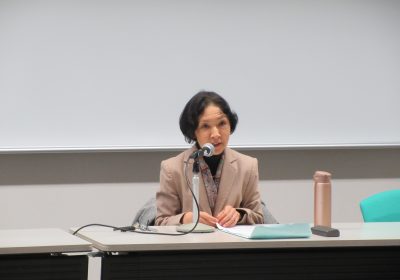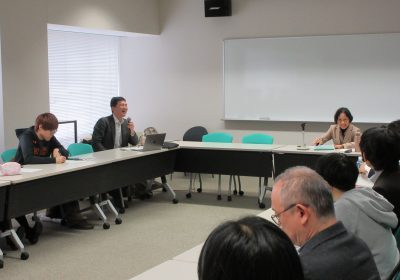【REPORT】The first meeting of the Series: “Challenges of Global Studies” “Area Studies and Global Studies : From the Viewpoint of an American Studies Researcher”

The first meeting of the Series: “Challenges of Global Studies”
“Area Studies and Global Studies: From the Viewpoint of an American Studies Researcher”
Date:December 12th, 2019. 13:00-14:30
Venue:Komaba Campus, the University of Tokyo
(https://www.u-tokyo.ac.jp/campusmap/cam02_01_17_j.html)
Speaker:
NISHIZAKI Fumiko(Director at Institute for Advanced Global Studies, Graduate School of Arts and Sciences)
Discussant:
TANABE Akio(Department of Interdisciplinary Cultural Studies, the Graduate School of Arts and Sciences)
BAJI Tomohito(Department of Advanced Social and International Studies, the Graduate School of Arts and Sciences)
DATE Kiyonobu(Department of Area Studies, the Graduate School of Arts and Sciences)
To learn more about the Global Studies Seminar series “Challenges in Global Studies,” click here.
【Report】
The first session of the Global Studies Seminar series “Challenges in Global Studies” took place on December 17th, 2019. The series brings together different perspectives from various fields of research, thereby aiming at deepening our understanding of “Global Studies”, a term that has increasingly been drawing attention in recent years. We were honored to invite as our first guest speaker Professor Fumiko Nishizaki (Director of the Institute for Advanced Global Studies, Graduate School of Arts and Sciences), a specialist in US diplomatic history, to give a lecture titled “Area Studies and Global Studies – from the Viewpoint of American Studies”.
Professor Nishizaki began by identifying herself as a scholar of Area Studies, emphasizing that she has been intentionally avoiding using the term “global”. From thereon, she referred to three possible ways in which a certain research can be embraced within the realm of “Global Studies”: that it concerns a global issue, that it looks at an area in a global context, and finally, that it deals with various regions of the world. While such research may be referred to as having a “global” dimension, however, one must equally question whether any research can be called “global” simply by dealing with a “foreign” nation, or by bringing one’s own nation into interaction with other regions. Professor Nishizaki carefully pointed out how the category could become void should it allow anything to be included as “global”.
While acknowledging these difficulties, she moved on to her discussion on the idea of “global” in the United States. She first mentioned the problems that arise from the idea of “the United States as a global nation”. The United States is unique in that it has consciously developed the self-image of a “global” nation since its independence, which assumes a “universality” other nations must follow. Such universal values seemed to have materialized as the nation grew into a major power in the twentieth century. This provoked the criticism that globalization is in fact nothing but Americanization.
Equally problematic, she continued, is the idea of “global” within the United States. As we see in the diversity among the witnesses in President Trump’s impeachment trial (many of whom are first and second generation immigrants), the United States envisions itself as a nation that does not “become old” but “revitalizes” over time. The ideal of a global nation encompassing universal values, however, is likely to carry a normative implication as to what kind of a nation the United States should become, thereby running the risk of binding together diverse peoples under a homogenous identity.
Towards the end of her talk, Professor Nishizaki analyzed the two major streams of research within the field of American Studies that deal with the concept of “global”, the first being strategic area studies, the second being research projects primarily led by scholars. US diplomatic history studies in the postwar period came to hold a US-Washington centric view on history, that is, it started to show the tendency of excluding from their research historical records and documents issued in non-US countries. Criticism from the so-called New Left has ended up in a form of domestically oriented self-criticism, too, which shows how the United States, having become a major power in world politics, became indifferent to views from the outside. The 1970s did in fact see the emergence of a new field called “international history”, but it is yet to become clear to what extent this has actually brought change to the American academia. Professor Nishizaki addressed the question as to whether the recent move in American universities to hire “researchers conducting research on their home country in the US” has really lead to the overcoming of American exceptionalism. She stressed the need to closely examine and carefully deconstruct this exceptionalist mentality.
She concluded her lecture by once again pointing out the danger that the topic of Global Studies, while meaningful as a subject of debate, can nevertheless become a cliché if applied uncritically, giving rise to a mood of cynicism. Acknowledging this danger, she argued, what is essential in the field of Global Studies is the effort on the side of the audience, to be aware of the global dimension of an issue, to be humble about their knowledge, and to never lose the inquisitive spirit. She explained how Global Studies itself began as a field of “exotic” research, thus creating room for new discoveries. Her talk was followed by a lively Q&A session involving both the discussants and the audience. One of the questions concerned how we can express the sense of discomfort we feel towards the nature of Global Studies conducted in the United States. Professor Nishizaki replied, while acknowledging the difficulty, that we should continue with our efforts to create a space in which we can freely and uncompromisingly speak and exchange such views. The seminar ended in great success.
【TAKASHIMA Asako(Project Researcher at Institute for Advanced Global Studies, Graduate School of Arts and Sciences)】
【 translated by ELLIS Naomi (Ph.D. Student at the University of California, Los Angeles)】


